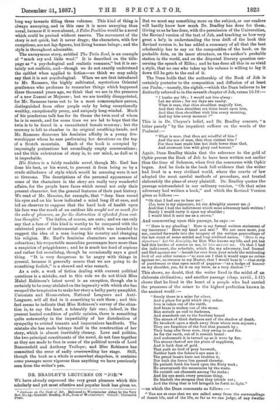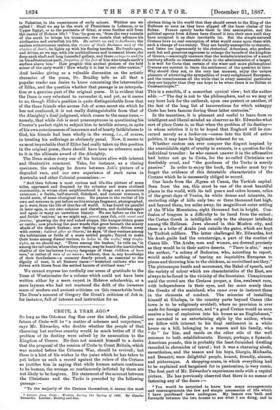DR. BRADLEY'S LECTURES ON " JOB." 1 WE have already expressed
the very great pleasure which this scholarly and yet most effective and popular book has given us.
• Lectures on the Book of Job. Delivered is Weetminster Abbey by the Very Be.. Geerge Granville Bradley, D.D., Dean of Westminster: Oxford Clarendon Press. But we must say something more on the subject, or our readers will hardly know how much Dr. Bradley has done for them. Giving us as he has done, with the permission of the Universities, the Revised version of the text of Job, and teaching us how very great a help in understanding the true drift of the book this Revised version is, he has added a summary of all that the best scholarship has to say on the composition of the book, on its probable date, on its inner structure, on the author's probable station in the world, and on the disputed literary question con- cerning the speech of Elihn ; and he has done all this in so vivid a style, that no one who takes up his volume is willing to lay it down till he gets to the end of it.
The Dean holds that the authorship of the Book of Job is certainly posterior to the composition and diffusion of at least one Psalm,—namely, the eighth,—which the Dean believes to be distinctly referred to in the seventh chapter of Sob, verses 16-18 :—
"I loathe my life ; I would not live Lawny: Let me alone; for my days are vanity.
What is man, that thou ehouldest magnify him, And that thou shonldest set thine heart upon him, And that thou shonldest visit him every morning, And try him every moment ?"
This is in Dr. Cheyne's belief, and Dr. Bradley concurs, "a bitter parody " by the impatient sufferer on the words of the Psalmist:— "What is man, that thou art mindful of him ? And the son of man, that then visitant him P For thou hest made him bat little lower than God, And orownest him with glory and honour."
Again, Dean Bradley thinks that the reference to the gold of Ophir proves the Book of Job to have been written not earlier than the time of Solomon, when first the commerce with Ophir began. And he finds in the book full evidence that the writer had lived in a very civilised world, where the courts of law adopted the most careful methods of procedure, and treated elaborately the pleas of every plaintiff. Dr. Bradley quotes the passage mistranslated in our ordinary version, " Oh that mine adversary had written a book," and which the Revised Version gives as follows
:- "Oh that I had one to hear me
(Lo, here is my signature, let the Almighty answer me ;) And that I had the indictment which mine adversary bath written !
Surely I would carry it upon my shoulder ; I would bind it unto me as a crown."
And commenting upon this passage, he says
" Here is my pleading! Here is my formal written statement of my innocence! Here my hand and seal !' We are Once more, yon see, carried forwards into the imagery of the written proceedings of the law court of some settled and long civilised nation. 'Here is my signature ! Let the Almighty, let Him Who knows my life, and yet has laid this burden of sorrow on me, let hint answer me. Oh that I had the indictment, the schedule, which He, my adversary, had framed and filed against me '—banish for ever from your minds the misleading book of our older version—Igo sure am I that it would urge no crime against me, no treason to my Master, that I would bear it '—that strip of parchment or that open scroll of papyrus—'es a badge of honour on my shoulder, yea, fix it on my brow, as a very diadem !' " This shows, no doubt, that the writer lived in the midst of an
elaborate civilisation; and another passage (chap. xxviii., 1-1).
shows that he lived in the heart of a people who had carried the processes of the miner to the highest perfection known in the ancient world :—
" Surely there is a mine for silver,
And a place for gold which they refine.
Pros is taken out of the earth,
And brass is molten out of the stone.
Man eetteth an end to darkness,
And searcheth out to the furthest bound The stones of thick darkness and of the shadow of death.
He breaketh open a shaft away from where men sojourn ;
They are forgotten of the foot that passeth by ;
They hang afar from men, they swing to and fro.
As for the earth, out of it cometh bread : And underneath it is turned up as it were by fire.
The stones thereof are the place of sapphires, And it bath dust of gold.
That path no bird of prey keoweth, Neither bath the falcon's eye seen it The proud beasts have not trodden it, Nor bath the fierce lion passed thereby.
He putteth forth his hand upon the flinty rock;
He overturneth the mountains by the roots.
He cutteth out channels among the rocks;
And his eye seeth every precious thing.
He bindeth the streams that they trickle not ; And the thing that is hid bringeth he forth to light,"
on which the Dean comments as follows :-
" You see at onoe that we are called away from the Aturroundinge of desert life, and of the life, so far as we can judge, of any dweller
in Palestine, to the experiences of early miners. Whither are we
called Shall we say to the work of Phenioiane in Lebanon, or to Upper Egypt, or to the peninsula of Sinai, or even farther still from the centre of Hebrew life ? Yea,' he goes on, from the very entrails of the earth he brings his treasures ; the metals that advance his civilisation and embellish his life. He setteth an end to darkness; the sunless subterranean realms, the stones of thick darkness and of the shadow of death, he lights up with his flaring torches. He breaks open, and drives, as we say, with his multitudinous and incessant blows, the deep-sank shaft and long tunnelled gallery, and there swings to and fro on his adventurous path, forgotten of the foot of him who treads earth's surface above him.' How graphic this ancient picture of the bold miner of the early world ! How wholly it is lost in our older version."
And besides giving us a valuable discussion on the artistic character of the poem, Dr. Bradley tells us all that a popular reader can desire to know concerning the intervention of Elihu, and the question whether that passage is an interpola- tion or a genuine part of the original poem. It is evident that the Dean is very reluctant to surrender it, and yet, as it seems to us, though Elihu's position is quite distinguishable from that of the three friends who accuse Job of some secret sin which he has not confessed, it is not really distinguishable from that of the Almighty's final judgment, which comes to the same issue,— namely, that while Job is most presumptuous in questioning his Creator's perfect right to subject him to terrible misery, in spite of his own consciousness of innocence and of hearty faithfulness to God, his friends had been wholly in the wrong, i.e., of course,
in treating his sufferings as obviously penal. Now, it seems to us most improbable that if Elihu had really taken up this position in the original poem, there should have been no reference made to it in the ultimate award of the Almighty.
The Dean makes every one of his lectures alive with interest and illustrative comment. Take, for instance, as a closing specimen, the analogy he draws between Job's picture of a degraded race, and our own experience of such races in Australia and other Colonial possessions :— " And then follows a most curious and life-like picture of some tribe, oppressed and despised by the robsater and more civilised community, in whose close neighbourhood it drags out a precarious existence ; a feeble, half-starved, dislodged, and outcast remnant, it would seem, of some aboriginal race. He pauses in the recital of his own sad sorrows to pat before ns this strange fragment, photographed, as it were, from the life of that far-off world. It has found its parallel in later ages, in our own colonies and elsewhere, and doubtless again and again in many an unwritten history. We see before us the few and feeble natives,' as we might say, gaunt, says Job, with want and famine, gnawing the dry and naked steppe, like hunger-bitten goats or cattle ; now plucking the poor weeds that grow beneath the scanty -shade of the desert bushes ; now feeding upon roots ; driven away with curses ; halteed after as thieves,' he says, if they venture among the habitations or fields of a more settled people ; forced to make their home among dismal ravines, in holes in the reeks,' very troglo- dytes, as we should say. There among the bushes,' he tells us, ' in among the tall nettles, where they swarm, may be heard the inarticulate chatter of the barbarous braying language of these children of base men,' or rather of men of no name ; without, that is, any knowledge of their forefathers—a memory dearly prized, as essential to the dignity of man, in all Eastern races—' wretched outlaws who are driven with blows from the settled haunts of civilised man.'"
We cannot express too cordially our sense of gratitude to the Dean of Westminster for a volume which could not have been written either by a mere expert in Hebrew scholarship, or a mere layman who had not mastered the drift of the immense mass of modern and ancient criticism on this remarkable book. The Dean's account of Gregory the Great's criticism of Job is, for instance, full of interest and instruction for us.







































 Previous page
Previous page